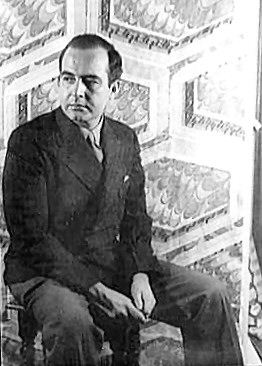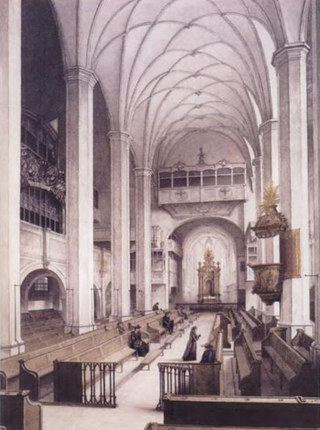Related Research Articles
The Book of Nephi: The Son of Nephi, Who Was the Son of Helaman is religious text of the Latter Day Saint movement. The book is usually referred to as Third Nephi or 3 Nephi, and is one of fifteen books that make up the Book of Mormon. This book was firstly called "III Nephi" in the 1879 edition and "Third Nephi" in the 1920 edition of the Book of Mormon. It contains an account of the visit of Jesus Christ to the inhabitants of ancient America. Jesus had told his disciples in Jerusalem according to the Bible in the Gospel of John, "And other sheep I have, which are not of this fold: them also I must bring, and they shall hear my voice; and there shall be one fold, and one shepherd." In this book, Christ declares to those in ancient America that they were these "other sheep" of whom he spoke. The account of this visit is recorded beginning in chapter 11 of 3 Nephi.

Erkki-Sven Tüür is an Estonian composer.
SATB is an initialism that describes the scoring of compositions for choirs, and also choirs of instruments. The initials are for the voice types: S for soprano, A for alto, T for tenor and B for bass.
Walter Sinclair Hartley was an American composer of contemporary (classical) music.
The Spring Symphony is a choral symphony by Benjamin Britten, his Opus 44. It is dedicated to Serge Koussevitzky and the Boston Symphony Orchestra. It was premiered in the Concertgebouw, Amsterdam, on Thursday 14 July 1949 as part of the Holland Festival, when the composer was 35. At the premiere the tenor soloist was Peter Pears, the soprano Jo Vincent and the contralto Kathleen Ferrier. The conductor was Eduard van Beinum. A recording of the performance survives and was first issued by Decca in August 1994.

Augusta Read Thomas is an American composer and professor.

Agnus Dei(Lamb of God) is a choral composition in one movement by Samuel Barber, his own arrangement of his Adagio for Strings (1936). In 1967, he set the Latin words of the liturgical Agnus Dei, a part of the Mass, for mixed chorus with optional organ or piano accompaniment. The music, in B-flat minor, has a duration of about eight minutes.
Hendrik Pienaar Hofmeyr is a South African composer. Born in Cape Town, he furthered his studies in Italy during 10 years of self-imposed exile as a conscientious objector. While there, he won the South African Opera Competition with The Fall of the House of Usher. He also received the annual Nederburg Prize for Opera for this work subsequent to its performance at the State Theatre in Pretoria in 1988. In the same year, he obtained first prize in an international competition in Italy with music for a short film by Wim Wenders. He returned to South Africa in 1992, and in 1997 won two major international composition competitions, the Queen Elisabeth Music Competition of Belgium and the first edition of the Dimitris Mitropoulos Competition in Athens. His 'Incantesimo' for solo flute was selected to represent South Africa at the ISCM World Music Days in Croatia in 2005. In 2008 he was honoured with a Kanna award by the Kleinkaroo National Arts Festival. He is currently Professor and Head of Composition and Theory at the South African College of Music at the University of Cape Town, where he obtained a DMus in 1999.

Hodie is a cantata by Ralph Vaughan Williams. Composed between 1953 and 1954, it is the composer's last major choral-orchestral composition, and was premiered under his baton at Worcester Cathedral, as part of the Three Choirs Festival, on 8 September 1954. The piece is dedicated to Herbert Howells. The cantata, in 16 movements, is scored for chorus, boys' choir, organ and orchestra, and features tenor, baritone, and soprano soloists.

Joshua is an oratorio by George Frideric Handel. It was composed in a month, from 19 July 1747 to 19 August 1747, six months before the beginning of the oratorio season. Joshua is Handel's fourth oratorio based on a libretto by Thomas Morell. The oratorio premiered on 9 March 1748 at the Covent Garden Theatre, London. Joshua is based on the Biblical story of Joshua as the leader of the ancient Israelites. The story follows the Israelites from their passage over the Jordan River into Caanan and through the Battle of Jericho. The work also includes a love story elaborated from a few hints in the Biblical narrative between Caleb's daughter Achsah and Othniel, a young soldier.

Lior Navok is an Israeli classical composer, conductor and pianist. He was born in Tel Aviv. His music has been performed internationally by orchestras and ensembles including the Oper Frankfurt, Nuernberg Opera, Israel Philharmonic Orchestra, Boston Modern Orchestra Project, and the Tanglewood Festival Orchestra. Amongst the awards he has received are those from the Israel Cultural Excellence Foundation and the Massachusetts Cultural Council. He has also received awards from the Fromm Music Foundation, Lili Boulanger Memorial Fund Award, and Israel Prime Minister Award. In 2004, he was one of seven composers awarded commissions for new musical works by the Serge Koussevitzky Foundation in the Library of Congress and the Koussevitzky Music Foundation.

Wahrlich, wahrlich, ich sage euch, BWV 86, is a church cantata by Johann Sebastian Bach. He composed it in Leipzig for Rogate, the fifth Sunday after Easter, and first performed it on 14 May 1724.

Messiah, the English-language oratorio composed by George Frideric Handel in 1741, is structured in three parts. The wordbook was supplied by Charles Jennens. This article covers Part I and describes the relation of the musical setting to the text. Part I begins with the prophecy of the Messiah and his virgin birth by several prophets, namely Isaiah. His birth is still rendered in words by Isaiah, followed by the annunciation to the shepherds as the only scene from a Gospel in the oratorio, and reflections on the Messiah's deeds. Part II covers the Passion, death, resurrection, ascension, and the later spreading of the Gospel. Part III concentrates on Paul's teaching of the resurrection of the dead and Christ's glorification in heaven.

Messiah, the English-language oratorio composed by George Frideric Handel in 1741, is structured in three parts. This listing covers Part II in a table and comments on individual movements, reflecting the relation of the musical setting to the text. Part I begins with the prophecy of the Messiah and his birth, shows the annunciation to the shepherds and reflects the Messiah's deeds on earth. Part II covers the Passion in nine movements including the oratorio's longest movement, an air for alto He was despised, then mentions death, resurrection, ascension, and reflects the spreading of the Gospel and its rejection. The part is concluded by a scene called "God's Triumph" that culminates in the Hallelujah chorus. Part III of the oratorio concentrates on Paul's teaching of the resurrection of the dead and Christ's glorification in heaven.

Millennial Choirs & Orchestras (MCO) is an American musical organization that was founded in 2007 for the purpose of teaching sacred and classical music, especially to its youth. The organization prioritizes in offering music performance education, with a focus on the works and styles of classical composers.

Nur jedem das Seine, BWV 163, is a church cantata by Johann Sebastian Bach. He composed the work in Weimar for the twenty-third Sunday after Trinity and first performed it on 24 November 1715.

Laßt uns sorgen, laßt uns wachen, BWV 213, is a secular cantata by Johann Sebastian Bach. Bach composed it in Leipzig on a text by Picander and first performed it on 5 September 1733. It is also known as Die Wahl des Herkules and Hercules am Scheidewege.
References
- ↑ Toone, Trent (10 January 2012). "Mormon Choral release debuts No. 1 on Billboard Classical Traditional chart". Deseret News . Retrieved 25 March 2023.
- ↑ Gillum, Gary. "Messiah in America". BYU Studies. Archived from the original on 17 September 2012. Retrieved 6 December 2012.